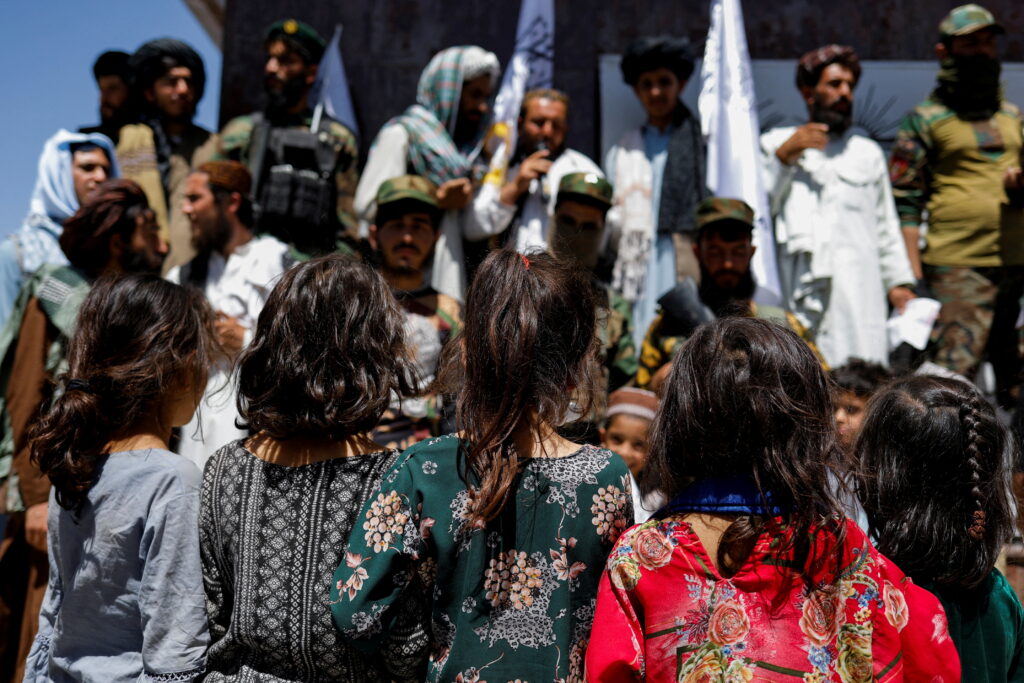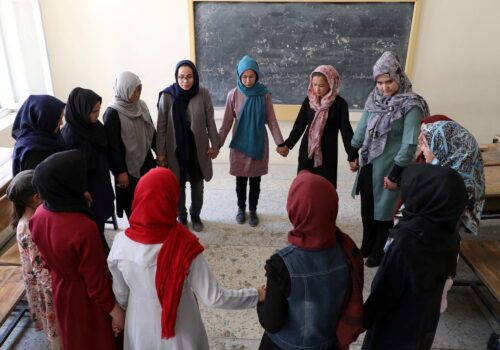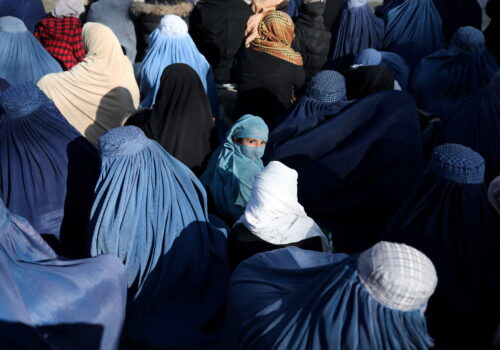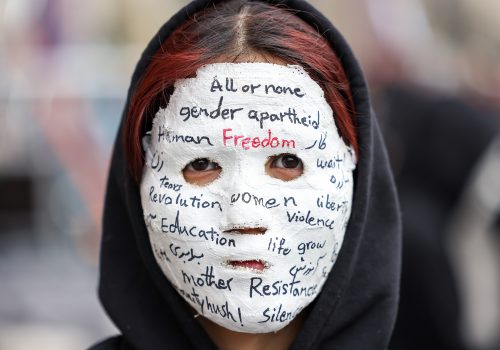A year ago today, on International Women’s Day, we joined dozens of prominent Afghan, Iranian, and international women’s rights defenders, jurists, and experts in launching the End Gender Apartheid Campaign. The campaign advocates for the recognition and codification of the crime of gender apartheid under international and domestic law. Animated by the deteriorating situation for women, girls, and others in our home country of Afghanistan, we believe that gender apartheid should be recognized as a crime under international law. Its current omission prevents us from being able to hold the Taliban regime accountable for the full scope of and intent behind its increasingly institutionalized gender-based oppression and domination.
For the past two and half years, the Taliban has systematically subjugated women, girls, and other people in Afghanistan, depriving them of their most fundamental rights and eviscerating their autonomy. The Taliban has issued more than 150 decrees, with more than eighty of them directly aimed at women, surpassing the number of decrees issued for all other sectors. Through these decrees, the Taliban has banned women’s rights to education, work, freedom of assembly, and speech. The regime has also severely restricted women’s access to justice and health care—as enforced by forceful and violent mechanisms, such as the Ministry for the Propagation of Virtue and Prevention of Vice, among others. In response, women have protested on the streets of Kabul and other major cities in Afghanistan, demanding their rights by risking their lives. The Taliban’s response has been violent, with civil resistance by women against these decrees met with beatings, lashings, the use of pepper spray, arbitrary arrests, torture, and even death. In recent weeks, the Taliban has arbitrarily detained and tortured women simply for not following the Taliban’s dress code, predominantly in Hazara and Tajik areas.
A standalone crime of gender apartheid would provide the appropriate legal mechanism to hold the Taliban accountable.
The situation continues to unfold with the Taliban regime consolidating its power and institutionalizing a system of governance that systematically dehumanizes, oppresses, and subjugates women, girls, and LGBTQI+ persons, as well as ethnic and religious minorities. There are no innocent bystanders in their dystopian project. Everyone is caught in the vortex.
There’s a term for the situation unfolding in Afghanistan: gender apartheid. On February 22, the United Nations (UN) Special Rapporteur on the situation of human rights in Afghanistan, Richard Bennett, presented his most recent report to the Human Rights Council. He explained that since the Taliban’s takeover, human rights have continued to worsen in the country. The report describes the situation as unparalleled and frames the Taliban’s systematic and widespread discrimination against women and girls as “gender apartheid.” Other UN experts and international rights groups have come to similar conclusions. Last month, for example, the UN Working Group on discrimination against women and girls specifically called for codification of the crime of gender apartheid in the Draft Crimes Against Humanity Convention before the UN, in direct response to the situation in Afghanistan. Six UN member states have also referenced the potential inclusion of the crime of gender apartheid in that convention. The draft convention will next be discussed before the UN in April.
The struggle against gender apartheid is not new for the women of Afghanistan, given the Taliban’s first period in power in the 1990s. Then, too, women referred to and denounced the Taliban’s institutionalized gender-based discrimination and systematic oppression of women as “gender apartheid.” Nevertheless, the term gender apartheid has remained unenumerated as a crime under international law, leaving a legal gap for accountability. This raises a question: Would women, girls, and others in Afghanistan have to struggle against dehumanization by the Taliban today had gender apartheid been codified and criminalized in the 1990s?
The End Gender Apartheid Campaign believes that male superiority and the dominance over women, girls, and LGBTQI+ persons form the core of the Taliban’s ideological system of governance. Such systematic oppression and subjugation are both ideologically and pragmatically existential for the Taliban’s regime.
Dismantling the Taliban’s institutionalized regime of systematic gender-based subjugation requires new legal and diplomatic tools. A standalone crime of gender apartheid would provide the appropriate legal mechanism to hold the Taliban accountable. The crime of apartheid is distinct due to its animating context of an institutionalized regime of systematic oppression and domination, and the perpetrator’s intent to maintain that regime. The proposed crime of gender apartheid would complement and reinforce the existing crime against humanity of gender persecution. Gender persecution comprises the intentional and severe deprivation of fundamental rights contrary to international law, with such targeting based on gender. It would also cover a distinct scope of acts and intent that further captures the nature of the crimes committed in situations like Taliban-controlled Afghanistan.
As International Women’s Day and Women’s History Month acknowledge the significance of women’s rights achievements throughout history, the situation in Afghanistan stands out as a setback for gender justice and gender equality everywhere, undermining hard-fought battles over generations. The international community should stand with the women of Afghanistan in solidarity and demand accountability for the atrocities committed by the Taliban. Gender apartheid must be included as a standalone crime against humanity in the Draft Crimes Against Humanity Convention, including in advance of the UN Sixth Committee (Legal)’s resumed session next month.
Azadah Raz Mohammad is a legal advisor for the Strategic Litigation Project at the Atlantic Council and a PhD candidate at the University of Melbourne.
Metra Mehran is the gender and policy advisor for the Strategic Litigation Project at the Atlantic Council.
Further reading
Thu, Mar 7, 2024
Inside Afghanistan’s gender apartheid: Listen as women reveal the impact of the Taliban’s oppressive decrees
Inside the Taliban's gender apartheid By
Since the Taliban's takeover of Afghanistan in August 2021, women have battled against increasingly severe restrictions on education, employment, and daily public life. This report, a joint effort by the Civic Engagement Project and the Atlantic Council’s South Asia Center, underscores their remarkable resilience and unyielding spirit in the face of gender apartheid.
Thu, Mar 7, 2024
Twice under the Taliban: The repeated nightmare of my generation
New Atlanticist By
The deepening human rights crisis under the Taliban underscores the dire need for global attention on the plight of Afghanistan’s women.
Thu, Oct 5, 2023
Gender apartheid is a horror. Now the United Nations can make it a crime against humanity.
New Atlanticist By Gissou Nia
The international community has an opportunity to codify the crime of gender apartheid in the United Nations’ crimes against humanity treaty. Learn more about gender apartheid from the Atlantic Council’s Gissou Nia.
Image: Afghan girls look at Taliban supporters on the second anniversary of the fall of Kabul on a street near the US embassy in Kabul, Afghanistan, August 15, 2023. REUTERS/Ali Khara



